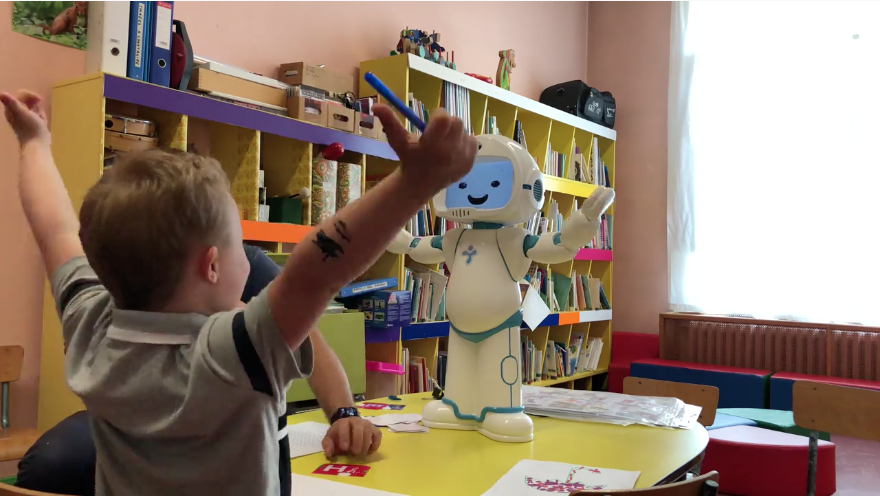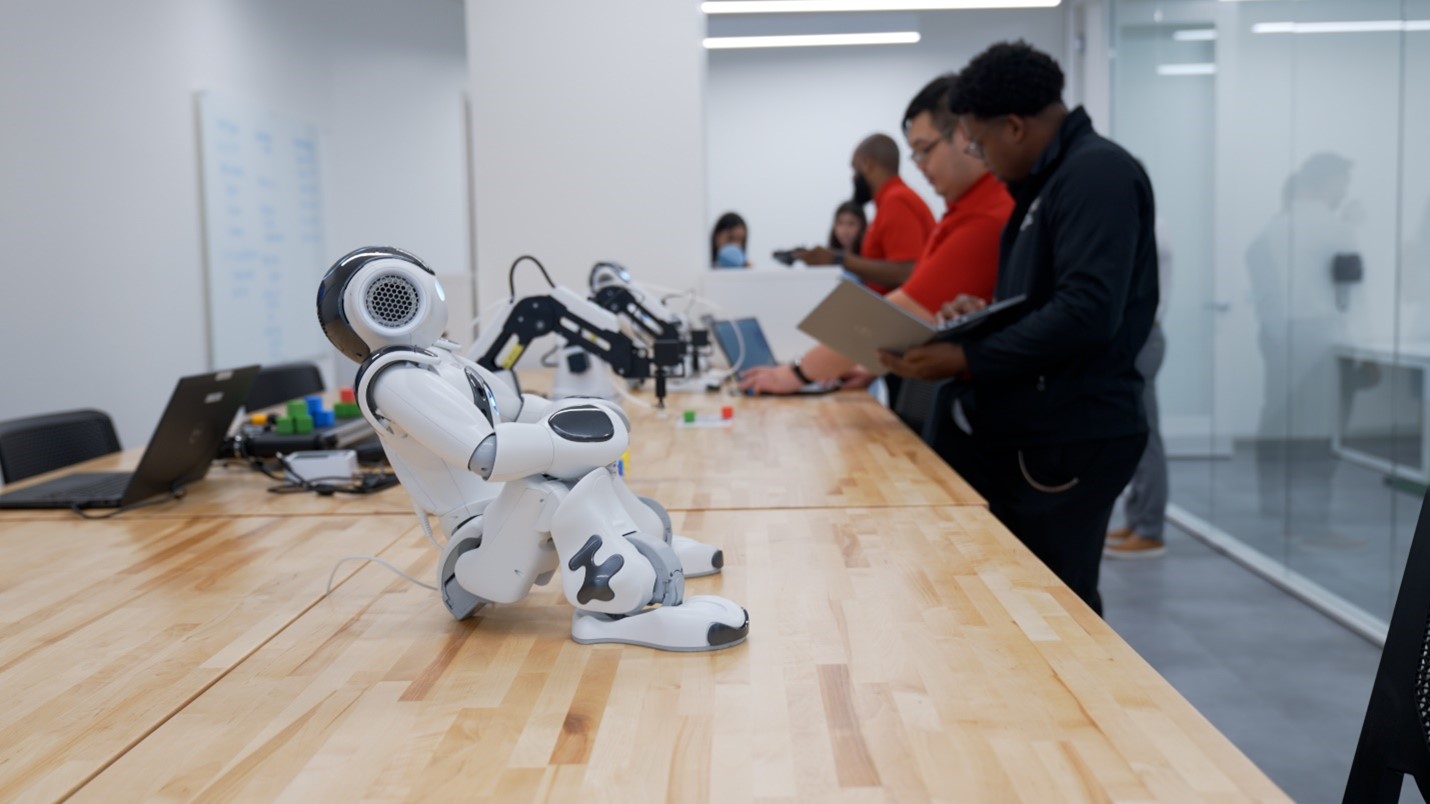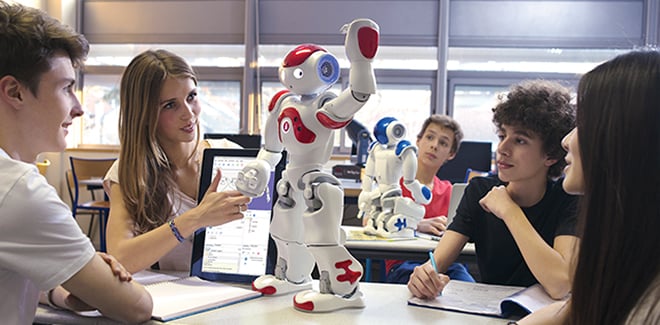RobotLAB Blog
Everything You Need To Know About Robotics in Businesses
Using Robotics to Support Sustainability
By Devin Partida

STEM educators have numerous tools at their disposal to keep students engaged with technology. It’s necessary in a tech-driven world, where students crave modern interactivity to maintain their attention and process concepts. Robotics is steadily becoming commonplace in classrooms as incorporation simplifies complex ideas and promotes sustainability to youth.
What can robotics offer STEM educators wanting to convey sustainable lessons to their students, and how can robots make a greener planet?
- 0 Comments
- Feb 10, 2023 2:31:02 PM
- Posted by Maria Alejandra Calcetero
- Topics: EdTech, STEM, Education, Computer Science, 21st Century Classroom, School, Student Engagement, Middle School, High School, autism, AI
How Robots Can Be Used in Autism Therapy
By Shannon Flynn

People are increasingly interested in how robots can help humans. From manufacturing facilities and complicated surgical procedures to preventing loneliness among older people and other isolated individuals, the possibilities are endless. Another area of significant interest relates to how robots could supplement therapy for people with autism. This approach is a developing option, but it’s already proving its worth.
- 0 Comments
- Feb 6, 2023 11:37:20 AM
- Posted by Maria Alejandra Calcetero
- Topics: EdTech, STEM, Education, Computer Science, 21st Century Classroom, School, Student Engagement, Middle School, High School, autism, AI
How to Secure Funding for STEM Extracurriculars
By Devin Partida

Maybe you have an amazing idea for a STEM extracurricular project, but you simply lack the budget needed to make it a reality. Here are the words you probably don’t want to hear: You have to write a grant proposal. Though it may seem daunting, as an educator, you already have the necessary skills to draft a compelling grant submission and secure the funds you need. Let’s get started.
- 0 Comments
- Nov 17, 2022 10:00:00 AM
- Posted by Maria Alejandra Calcetero
- Topics: EdTech, STEM, Education, Computer Science, 21st Century Classroom, School, Student Engagement, Middle School, High School, AI
Promoting Diversity and Inclusion in Robotics
By Carol Grace

Compared to other careers, underrepresentation is rampant in STEM-related roles. According to job statistics by Pew Research Center, Black and Hispanic workers remain underrepresented in various STEM occupations, only making up 8-9% of STEM jobs. This share is lower in specific job clusters, such as engineering and architecture, with only 5% of black workers making up the total workforce. While women comprise 50% of the STEM workforce, 74% are healthcare practitioners and technicians — making other fields vastly outnumbered by men. With robotics highly dependent on computers and engineering, it’s unsurprising that diversity in the industry is at an all-time low.
- 0 Comments
- Nov 16, 2022 7:48:57 AM
- Posted by Maria Alejandra Calcetero
- Topics: EdTech, STEM, Education, Computer Science, 21st Century Classroom, School, Student Engagement, Middle School, High School, AI
Using Robotics to Teach About Cybersecurity
By Devin Partida Photo by Dan Nelson on Unsplash
Photo by Dan Nelson on Unsplash
Curricula must shift for educators to create a well-informed next generation of cybersecurity analysts. Though robotics is an umbrella containing many branches, K-12 teachers can use robotics to teach cybersecurity more effectively than other subjects.
- 0 Comments
- Oct 6, 2022 3:11:12 PM
- Posted by Maria Alejandra Calcetero
- Topics: EdTech, STEM, Education, Computer Science, 21st Century Classroom, School, Student Engagement, Middle School, High School, AI
How Crucial Is Artificial Intelligence to the Rise of Ed Tech?
By Ellie Poverly-jpg.jpeg?width=1920&name=possessed-photography-jIBMSMs4_kA-unsplash%20(002)-jpg.jpeg) Image Source: www.unsplash.com
Image Source: www.unsplash.com
Anyone in the education sector knows that new technologies are poised to revolutionize the traditional classroom.
In the past few years, educational institutions have adapted to a new normal brought about by the COVID-19 pandemic. Parents, students, teachers and administrators had to remain flexible, adjust to virtual learning environments and adopt new digital technologies to facilitate learning.
Although the industry is still reeling from the adverse effects of the pandemic, the global disruption sparked major growth in one relevant sector: education technology (ed tech).
A primary example of ed tech is artificial intelligence (AI), which has already proven itself as a highly useful, effective tool with various applications and benefits. How important is AI in supporting the rise of the ed tech market? Will more K-12 and secondary education institutions adopt AI-based solutions in the future?
- 0 Comments
- Sep 17, 2022 10:00:00 AM
- Posted by Mike Nardine
- Topics: EdTech, STEM, Education, Computer Science, 21st Century Classroom, School, Student Engagement, Middle School, High School, AI
The Alan B. Levan | NSU Broward Center of Innovation integrates a robotics AI LAB for entrepreneurs

The implementation of the lab will provide entrepreneurs with real world experience in robotics and artificial intelligence.
September 1st, 2022 – San Francisco, CA – The Alan B. Levan | NSU Broward Center of Innovation (“Levan Center”), in partnership with RobotLAB, the leading educational robotics company, partnered to build an artificial intelligence and robotics lab.
- 0 Comments
- Sep 1, 2022 11:11:55 AM
- Posted by Mike Nardine
- Topics: EdTech, STEM, Education, Computer Science, 21st Century Classroom, School, Student Engagement, Middle School, High School, AI
How Hidden Classroom Dynamics Can Stymie Girls in STEM
By Youki Terada
If we want to close the gender gap in science, we need to look at the invisible forces that shape classroom culture.
- 0 Comments
- Jun 29, 2021 10:00:00 AM
- Posted by Natalia Galvis
- Topics: Robotics, EdTech, STEM, Computer Science, Problem Based Learning (PBL), teachers, Coding, Robots,, students, STEMchat, Edchat, Digital Technology, teaching, online
4 Steps to Maximize Summer Learning
 Photo by Start Digital on Unsplash
Photo by Start Digital on Unsplash
Summer learning will play a critical role in students' return to full-time in-person learning this fall.
- 0 Comments
- Jun 25, 2021 10:00:00 AM
- Posted by Natalia Galvis
- Topics: Robotics, EdTech, STEM, Computer Science, Problem Based Learning (PBL), teachers, Coding, Robots,, students, STEMchat, Edchat, Digital Technology, teaching, online
Turn To Coding And Robotics If You Want Your Students To Posses a Growth Mindset

Diligence, a curious spirit, and perseverance are qualities we desire to see in our students. These traits are elements of the “growth mindset.” Teaching students coding presents one of the best opportunities to develop and nurture kids’ growth mindset in the school setting. This article shows five scenarios to support this position.
- 0 Comments
- Jun 24, 2021 10:00:00 AM
- Posted by Natalia Galvis
- Topics: Robotics, EdTech, STEM, Computer Science, Problem Based Learning (PBL), teachers, Coding, Robots,, students, STEMchat, Edchat, Digital Technology, teaching, online
Relevant Posts
- Augmented Reality: A Tool for Teaching Students Robot Programming
- Fostering Innovation Through Youth Education in STEM and EdTech
- How Parents Can Foster STEM Learning Beyond the Classroom
- How Robotics Cultivates a Deep Understanding of Mathematics in Students
- RobotLAB Receives EDTech Chronicle 2023 ‘BESTIE’ Award for Landmark Partnership with American Samoa Dept. of Education.
Subscribe to Email Updates
-
I Want To Learn MoreADDITIONAL INFORMATION
